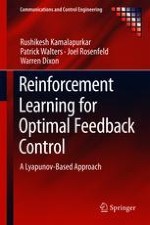2018 | OriginalPaper | Buchkapitel
5. Differential Graphical Games
verfasst von : Rushikesh Kamalapurkar, Patrick Walters, Joel Rosenfeld, Warren Dixon
Erschienen in: Reinforcement Learning for Optimal Feedback Control
Aktivieren Sie unsere intelligente Suche, um passende Fachinhalte oder Patente zu finden.
Wählen Sie Textabschnitte aus um mit Künstlicher Intelligenz passenden Patente zu finden. powered by
Markieren Sie Textabschnitte, um KI-gestützt weitere passende Inhalte zu finden. powered by
